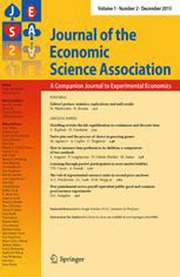Article contents
Experimental (re-)analysis of the house-money effect in a public goods game
Published online by Cambridge University Press: 17 January 2025
Abstract
Experiments in economics usually provide subjects with starting capital to be used in the experiment. This practice could affect decisions as there is no risk of loss. This phenomenon is known as the house-money effect. In a repeated public goods game, we test for house-money effects by paying subjects in advance an amount they could lose in the experiment. We do not find evidence of a house-money effect over time.
JEL classification
- Type
- Original Paper
- Information
- Copyright
- Copyright © The Author(s), under exclusive licence to Economic Science Association 2022. corrected publication 2023.
Footnotes
The original online version of this article was revised: Due to incorrect details in the reference Cherry et al., (2005). Now, it has been corrected.
A correction to this article is available online at https://doi.org/10.1007/s40881-023-00126-6.
corrected publication 2023
References
- 3
- Cited by


